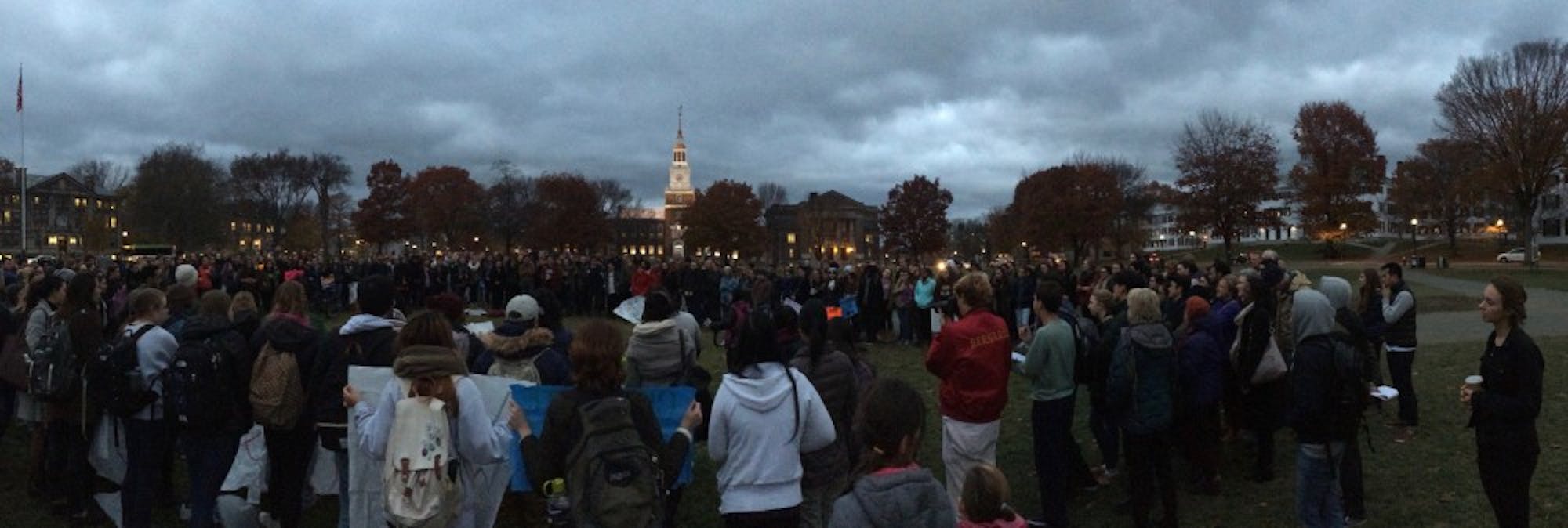At 4 p.m. this afternoon, over 300 Dartmouth students, faculty and Upper Valley community members participated in a “Walk for Love and Justice” to protest the election of Donald Trump to the White House.
The march — organized by Alyssa Jorgensen ’17 and Ashley Zepeda ’18, among others — follows a night in which more than 6,500 Hanover residents voted for Clinton and 926 cast ballots for Trump.
The march began on the Green at the site of a sit-in where students had camped out the night before. At the outset of the march, about 100 people were present, including demonstrators who had been sitting-in throughout the day. By the end of the walk, over 300 people had joined the group.
As they walked into Hanover through Main Street, Lebanon Street, Crosby Street and East Wheelock Street, demonstrators alternated between chants of “Love trumps hate,” “No justice no peace,” “Fuck Donald Trump” and “Black Lives Matter.” Demonstrators occupied the right lane of the road and brought vehicular traffic to a standstill on Main Street. In a show of support, several drivers gave demonstrators a thumbs-up.
Upon the demonstrators’ return to the Green, the crowd formed a circle and began chanting “down with white supremacy.” Following this chant, Jorgensen addressed the crowd, calling for a moment of silence to honor “the people here today who choose compassion and love over what our nation chose last night.”
Afterward, various speakers were given the opportunity to address the crowd. Among them was Corinne Kasper ’17, who said, “Apparently we are loud and apparently we are powerful.”
Though several subsequent speakers were greeted with widespread applause when they encouraged demonstrators to hold onto their beliefs and resolves despite the results of last night’s election, a divergence of opinion within the crowd became clear when speakers addressed the fragmentation of political movements along racial lines.
Keva Bui ’17 expressed frustration with what they perceived to be a failure of mainstream political movements, such as feminism, to address the issues faced by LGBTQIA groups and people of color.
“This is not about Hillary Clinton. This is not about white women…this is not about white feminism,” they said. “This is about our communities’ resistance and revolution against the system of violence that has been perpetuated against us for centuries.”
English professor Alexis Jetter later challenged Bui’s indictment of “white feminism.”
“As a white woman, and as a feminist, and as a lesbian, and as a leftist, I don’t want anyone here to say ‘This is not about white feminism’ as if white feminists didn’t fight for Bernie, didn’t fight for Hillary,” she said.
Jetter then explained her belief that splitting the feminist movement across racial lines makes it easier for right-wing politicians to create and exploit divisions within the liberal electorate.
“Don’t do the right-wing haters’ work for them,” she said. “Don’t divide up like that.”
Maieda Janjua ’17 rebutted, saying that she believed feminism should address various racial and socioeconomic factors. She then vocalized her perception that “white feminism” has failed in this regard. Janjua had the final word before the group dispersed.
“Your feminism is not feminism if it is only for white people,” she said.
Immediately following the demonstration, Jorgensen explained that the demonstrators’ walk around Hanover was organized by Kappa Delta Epsilon sorority, but that many of the demonstrators assembled serendipitously. Zepeda added that she was pleasantly surprised by the large turnout of students and residents and was particularly impressed by the demonstrators’ rapid poster-making. While she explained that she was still upset following the results of last night’s election, she found the large body of support for today’s demonstration empowering.
Jorgensen echoed this sentiment and explained that observing the crowd’s large size as she walked through Hanover caused her to feel a sense of empowerment.
Eliza Rockefeller ’17, who said she was upset by the election results, found it consoling to feel supported by “like-minded people.”




